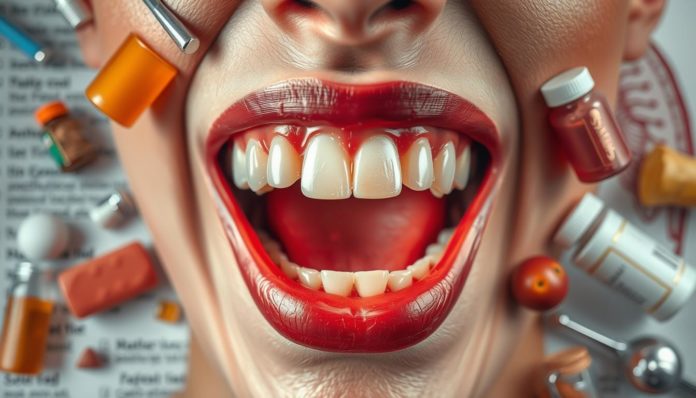Did you know nearly 15% of people get a metallic taste in their mouth? This fact shows that taste issues, or dysgeusia, are quite common. A bitter taste isn’t just annoying—it might mean health problems, from teeth issues to body-wide conditions.
Finding out why you have a metallic taste in mouth causes is key. It could be from certain medicines or not cleaning your teeth well. Knowing the cause can really help improve your life. This article will look into why this happens and how to fix it.
Keep reading as we dive into why this odd taste happens and ways to handle it. Doing so can lead to better health and feeling good.
Common Causes of a Metallic Taste in Your Mouth
Feeling a metallic taste in your mouth can be confusing. Knowing why it happens can ease this weird feeling. Let’s look at why this taste change occurs.
Medications
Many drugs like antibiotics, antidepressants, and heart medicines can change how things taste. They might make your mouth taste like metal. This change can linger for a while.
Dental Issues
If you don’t keep your teeth clean, you might get a metallic taste. Keeping up with dental care is important to avoid this. Your dentist is key to fixing these issues.

Pregnancy
When you’re pregnant, your hormones change a lot. This can cause a temporary metallic taste. Drinking water and eating well can help handle this during pregnancy.
Finding out why your mouth tastes like metal is the first step to feeling better. Tackling these causes is important for enjoying your food again.
Medications Leading to a Metallic Taste
Medications can change how things taste. Patients often report a metallic taste from certain drugs. This side effect comes from various medication types.

Antibiotics
Some antibiotics, like metronidazole, clarithromycin, and tetracycline, lead to a metallic taste. This taste can make eating and drinking less enjoyable. But it usually goes away after the medicine course ends. Patients should talk to their doctors before stopping any medication.
Heart Medications
Heart drugs, such as ACE inhibitors, can cause a metallic taste too. Lisinopril and captopril are common examples. If you notice this, it’s important to talk to your cardiologist. They can suggest other treatments.
Antidepressants
Some antidepressants, like SSRIs paroxetine and sertraline, might make food taste metallic. This can affect your appetite and how much you enjoy food. Always consult a healthcare professional for advice. They can help manage this side effect while treating mental health.
| Medication Type | Example Drugs | Potential Side Effect |
|---|---|---|
| Antibiotics | Metronidazole, Clarithromycin, Tetracycline | Metallic Taste |
| Heart Medications | Lisinopril, Captopril | Metallic Taste |
| Antidepressants | Paroxetine, Sertraline | Metallic Taste |
Dental Issues and Poor Oral Hygiene
Poor oral hygiene often leads to a metallic taste in your mouth. Bad tooth brushing habits can cause dental problems like gingivitis and periodontitis. These issues harm your dental health and might cause that metallic feeling.
It’s vital to brush and floss regularly to keep your teeth healthy and stop bacteria growth. Gingivitis, if ignored, becomes periodontitis. This more severe condition affects your oral health more deeply.
To avoid oral health problems, stick to a good oral hygiene routine. Correcting bad tooth brushing habits is crucial. Here’s how to keep dental health in check:
- Brush your teeth at least twice a day using fluoride toothpaste.
- Floss daily to remove plaque from areas your toothbrush can’t reach.
- Visit your dentist regularly for professional cleanings and check-ups.
- Avoid sugary foods and drinks that can contribute to tooth decay.
Better dental hygiene can greatly improve your health and lower the risk of a metallic taste. Taking care of your teeth is important to avoid dental diseases like gingivitis and periodontitis.
Sinus and Respiratory Infections
Sinus and respiratory infections can deeply impact how we feel. Symptoms like a stuffy nose and coughing are common. Yet, they can also change how things taste. This change can make your favorite foods seem less enjoyable. Learning about these infections is crucial for dealing with their effects.
Common Cold
The common cold is a viral issue that hits the upper respiratory system. Symptoms can include a really stuffed nose and a sore throat. These troubles can mess with how food tastes, often leaving a metallic or bland taste.
Sinusitis
Sinusitis means your sinuses are inflamed, sometimes due to bacteria or allergies. This leads to ongoing stuffy nose and pain in your face. Difficulty breathing can come with this, changing how you taste things. This happens because of both the stuffiness and its effect on breathing.
Upper Respiratory Infections
Upper respiratory infections cover conditions like sinusitis and colds. They mainly affect your nose and throat. This impacts your breathing and can change how food tastes to you. Congestion and dripping from your nose play huge roles in this taste change.
Metallic Taste in Mouth Causes
A metallic taste in the mouth is usually a sign something is off. It’s called dysgeusia. It might point to various health issues, from minor infections to big diseases.
One common cause is being around environmental pollutants. Stuff like lead and mercury can make your mouth taste metallic. It really affects your day. Also, brain issues, like multiple sclerosis and epilepsy, can cause this weird taste.
Some diseases, like diabetes and chronic kidney disease, can also make your mouth taste funny. Mental health is important too. Depression and anxiety can mess with how things taste.
| Cause | Description |
|---|---|
| Environmental Exposures | Heavy metals like lead and mercury |
| Central Nervous System Disorders | Diseases like multiple sclerosis and epilepsy |
| Systemic Diseases | Conditions such as diabetes and chronic kidney disease |
| Psychological Conditions | Depression and anxiety impacting taste |
It’s important to figure out why you’re tasting metal in your mouth. Knowing the reason can help you get the right treatment. This odd taste links how we perceive taste to our overall health.
Impact of Pregnancy on Taste
Pregnancy is an amazing journey that changes a woman’s body. One notable change is how tastes can change, often discussed. Many women, especially in the first trimester, report a bitter or metallic taste.
This is known as dysgeusia. It happens because hormones, like estrogen, change how we taste. This can cause odd cravings or dislikes, changing what and how we eat.
As pregnancy goes on, taste usually returns to normal. This lets the individual enjoy more foods again. But until then, there are ways to cope with the taste changes. Drinking plenty of water, keeping your mouth clean, and using plastic utensils can help with the bad taste. For more guidance, visit this comprehensive guide on managing taste changes during pregnancy.
Here’s a closer look at some remedies and how well they work:
| Remedy | Effectiveness |
|---|---|
| Staying hydrated | Highly Effective |
| Good oral hygiene | Moderately Effective |
| Using plastic cutlery | Effective |
| Dietary adjustments | Variable |
Understanding these taste changes during pregnancy is important. By knowing about the hormonal impacts, pregnant women can make better food choices. This helps in maintaining good health during this special time.
Potential Environmental Contributors
When you find a metallic taste in your mouth, heavy metals like lead and mercury might be the cause. These contaminants demand our attention. They pose health risks we need to tackle to keep communities safe.
Lead Exposure
Lead finds its way to us through things like old paint and lead pipes. It’s also in some soils. This exposure is dangerous. It can harm children’s growth and cause kidney problems in adults.
Keeping safe means getting rid of lead around us. We also need to stay clean and vigilant.
Mercury Inhalation
Mercury comes from things like factories and certain seafood. Breathing it in or eating risky fish can hurt your brain and body in big ways. We must eat less of these fish and keep our air clean.
Fighting for tougher laws on emissions helps too. It means less mercury in the air we all share.
| Contaminant | Sources | Health Risks | Prevention |
|---|---|---|---|
| Lead | Old Paint, Contaminated Soil, Lead Pipes | Developmental Issues, Kidney Damage | Remove Lead Sources, Practice Good Hygiene |
| Mercury | Industrial Emissions, Dental Amalgams, Certain Fish | Neurological Effects, Bodily Disruptions | Limit High-Mercury Fish Intake, Ensure Proper Ventilation |
Systemic Health Conditions
Systemic health conditions can change how things taste, sometimes causing a metallic taste. This is often seen in chronic illnesses. It’s common in many long-term health problems.
Kidney Disease
Kidney disease leads to a build-up of waste, causing symptoms like changes in taste. People with this disease might taste metal when they eat. Treatments that remove toxins can help, but it’s important to know how this happens.
Central Nervous System Disorders
Disorders like multiple sclerosis (MS) and Bell’s palsy affect taste due to their impact on the brain and nerves. This can make food taste metallic or strange. Treating the neurological issue can help manage these taste problems.
Chemotherapy and Cancer Treatments
Going through chemotherapy and other cancer treatment methods often leads to side effects. Changes in taste are especially common. Many people notice a metallic taste that makes eating less enjoyable.
- Incorporating more flavorful foods to counteract the metallic taste.
- Using alternative utensils like plastic forks and spoons to minimize the metallic sensation.
- Maintaining good oral hygiene practices to help reduce taste alterations.
People getting cancer treatment may find eating better with some changes to their diet. Talking to nutritionists and doctors can help. They offer advice on dealing with taste changes during chemotherapy treatment.
Diagnosis and Treatment Options
A metallic taste in your mouth can be troubling. It’s crucial to figure out why it’s happening for effective treatment. The first move is to get advice from healthcare professionals. They look at dental and medical factors to find the cause.
Visit Your Dentist
Your dentist should be the first person you see. Many times, dental problems cause the metallic taste. They will check your mouth for gum disease, cavities, or if you’re not cleaning your teeth well. Getting regular dental care helps keep your mouth healthy and avoids such issues.
Consult With Your Doctor
If there’s no dental reason, see your doctor next. They can tell if the problem is from your health or medicines. Sharing details about your daily life and medicines helps your doctor figure things out. They might use blood tests or other methods to diagnose problems like kidney disease or not having enough vitamins.
Treating Underlying Conditions
After diagnosing the reason for the metallic taste, the next step is treatment. What you need depends on what’s causing the problem. If medicine is the issue, your doctor might change it or suggest something else. Should it be a health condition like a sinus infection or kidney disease, you will need specific treatments. Following your healthcare provider’s advice and treatment plans will help fix the metallic taste and boost your health.
FAQ
What is dysgeusia?
Dysgeusia is when your taste sense changes. You might taste a persistent metallic flavor.
What are common causes of a metallic taste in the mouth?
Some common reasons are medications, dental problems, and being pregnant. Other causes include some diseases, environmental factors, and brain disorders.
Can medications cause a metallic taste?
Yes, certain drugs like antibiotics, heart meds, and mood lifters can change your taste. This may lead to tasting metal.
How do dental issues contribute to a metallic taste?
Bad dental care, gum disease, or teeth infections can cause metallic taste. Keeping your mouth clean and regular visits to the dentist help avoid it.
Why does pregnancy cause a metallic taste?
During early pregnancy, hormone changes can shift how things taste. This might give you a metallic taste.
Can respiratory infections cause a metallic taste?
Yes, infections like colds, sinus issues, and throat infections can change taste. You may notice a metallic taste.
How do systemic health conditions lead to a metallic taste?
Problems with kidneys or the nervous system can alter taste. This may cause a metallic flavor.
What role does environmental exposure play in causing a metallic taste?
Being around heavy metals like lead and mercury can give you a metallic taste. It’s important to avoid these substances.
How does chemotherapy affect taste?
Chemotherapy and some cancer treatments change how you taste things. You might get a metallic taste. Changing what you eat and using different utensils can help.
How is a metallic taste diagnosed and treated?
Seeing a dentist can check for mouth problems. A doctor can look for medical issues. Treating this taste depends on its cause. It might mean changing medicine or treating a specific problem.


